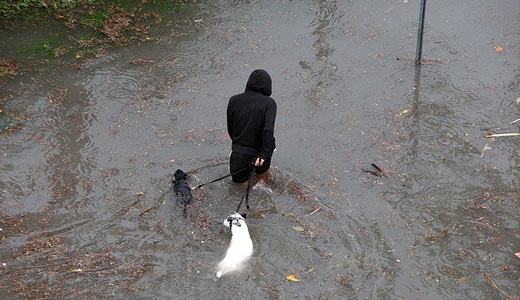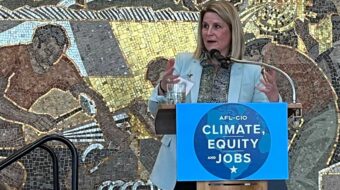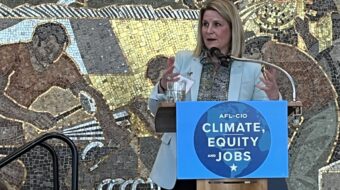
Rising sea levels and storm surges – the inevitable byproducts of climate change – will turn Miami, Florida into the “American Atlantis,” putting the city underwater by the end of the century, according to experts. Harold Wanless, chair of the University of Miami’s geological sciences department, said the state’s flat topography puts “more than $416 billion in assets at risk to storm-related flooding and sea level rise.” That rise is already 60 percent greater than was expected from 1990 through 2011. And as Obama so pointed out in a climate change-focused speech today in D.C., preventative measures must be taken.
Coastal studies researcher Orrin H. Pilkey of Duke University advised coastal communities to prepare for a rise of at least five feet by 2100. Australian scientist and sea level expert John A. Church added, “I think we need to immediately begin thinking about our coastal cities. How are we going to protect them? We can’t afford to protect everything. We will have to abandon some areas.”
“Miami, as we know it today, is doomed,” predicted Wanless. “It’s not a question of if. It’s a question of when. Flooding everywhere, pooling in streets, flooding parking lots, turning intersections into submarine crossings – this is what global warming [will] look like. If you live in South Florida and you’re not building a boat, you’re not facing reality.”
“South Florida is toast,” agreed Florida climate change policy advocate Tom Gustafson. “Even if we cut carbon pollution overnight, it won’t save us.” And anyway, “those solutions are not likely to be forthcoming from the political realm. You can’t even say the words ‘climate change’ on the House floor without being run out of the building.”
But even if, as Gustafson points out, slashing carbon output won’t prevent the floodpocalypse that awaits Miami, it will certainly help. And President Obama made significant headway on that front today at a speech in Georgetown University. He announced a plan that will limit carbon dioxide emissions from existing power plants, amongst a variety of other environmental initiatives. The Obama administration does not need Congressional approval for this, thanks to a 2007 Supreme Court decision that gave the Environmental Protection Agency additional regulatory powers. The emphasis will be placed on cutting the carbon output of coal-fired plants.
Obama also discussed the controversial Keystone XL pipeline, arguing that if it exacerbates greenhouse gas emissions, the project should not move ahead. “The net effects of the pipeline’s impact on our climate will be absolutely critical to determining whether this project can go forward,” he said.
“Our planet is changing in ways that will have profound impacts on all of humankind,” the president continued. “As a president, as a father, and as an American, I’m here to say, ‘We need to act.'”
The pending disaster that may hit Southern Florida stands as just one example of how climate change is going to make everything harder, and how it is prudent for appropriate measures to be taken now. For more recent examples of devastation through inaction, one can easily look to Hurricane Katrina-ravaged New Orleans, and post-Hurricane Sandy New York and New Jersey.
As of right now, there’s a lot of work to do, say experts. “There is no planning, no serious thinking going on,” remarked Florida disaster impact analyst Chuck Watson. And it goes beyond just the climate change denial frequently exhibited by Republicans in Congress: “It is beyond denial, it’s flat-out delusional.”
After all, as the president concluded today, “Sticking your head in the sand may make you feel safer, but it won’t guard against the coming storm.”
Photo: In this 2009 photo, a man struggles to walk his dogs in flooded Miami Beach, Florida. maxstrz/Flickr (CC)












Comments